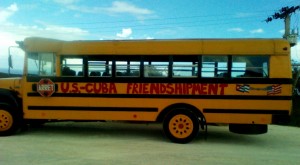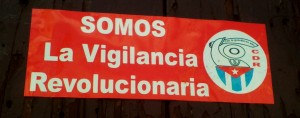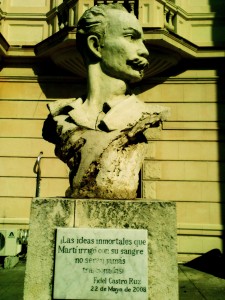Negotiating Libertad
May 3, 2012 by jelopez
“…all men are created equal, that they are endowed by their Creator with certain unalienable Rights, that among these are Life, Liberty and the pursuit of Happiness…That whenever any Form of Government becomes destructive of these ends, it is the Right of the People to alter or to abolish it, and to institute new Government, laying its foundation on such principles and organizing its powers in such form, as to them shall seem most likely to effect their Safety and Happiness.”
One of the workers at the Miami Airport (I referred to him as Intense Guy in my journal) said that to truly understand what it is like to be Cuban, you have to live there – on Cuban pesos. And it’s true (not that this is unique to Cuba). See, Cuba is a country of contradictions operating on extremes.
In Trinidad, we met a 17 year old student of pedagogy hoping to become a Geography teacher. He rocked a red American Eagle T-Shirt, two gold rings and piercings, a sizeable watch, and a cell phone – something he says that when you own in Cuba, you flaunt. Then he expressed admiration for Fidel’s simplicity. He complained about the lack of internet access, but said he doesn’t need it to be educated. He made quite the effort to display his knowledge, name-dropping the iPhone 4S Siri and Abraham Lincoln. He said the government was not repressive but that it did block internet access in order to protect Cubans from anti-revolutionary activity including pornography. He complained about poverty and called the Cuban peso trash – the CUC is where it’s at. Immediately after, he praised free healthcare and education and reminded us that was something we did not have as citizens of the United States. Most eagerly, he held Cuba’s party scene on a pedestal.
In Havana, we met an Angola veteran now working at a souvenir shop who said the Special Period was a terrible time but that he is grateful for the independence it granted Cuba; it freed Cuba from its Soviet crutches.
 We saw the contradictions at work when we experienced deep anti-Americanism (or rather, anti-United States sentiment) followed by officials saying “We just want to be friends” and petitioning for lifting the embargo. Cubans made claims of being internationally high-ranking in biotechnology, medicine, and education while blaming the embargo (or bloqueo) for severely hindering their resources.
We saw the contradictions at work when we experienced deep anti-Americanism (or rather, anti-United States sentiment) followed by officials saying “We just want to be friends” and petitioning for lifting the embargo. Cubans made claims of being internationally high-ranking in biotechnology, medicine, and education while blaming the embargo (or bloqueo) for severely hindering their resources.
They claimed to be a “raceless” society in which racism was not present. However, when Los Hermanazos (a Black rap group) came to the Hotel Plaza for their gathering with us, we were told Cubans were not allowed in hotel. Hours later a white professor from the University of Havana held a lecture with us in that very hotel.
Cuba works under a socialist model which commodifies its people and its labor. We saw a Comite de la Defense Revolucionaria (CDR) which as the one meeting we had would have us believe is a community organization throwing fun parties. The signs openly proclaiming “Somos la vigilancia revolucionaria” paint a slightly different picture.
And it is exactly that – something which comes across as pure, innocent, well-intentioned (or it at least tries) which is simultaneously authoritative, repressive, aggressive – which typifies the conversations we had with Cubans of different ages, races, and walks of life. They, with little prodding, made harsh criticisms only to retract them as soon as they seemed to have gone too far.
Those who did not retract spoke in hushed tones, hyperaware of their surroundings. There really are some things you don’t talk about in Cuba. I experienced internal battles that struggled to make sense of an existence they live and love in the midst of hardships they can’t bring themselves to protest wholeheartedly.
I sensed hesitation, even fear sometimes or at least nervousness, but also faith and fidelity to their now ill 85 year old leader and his pantheon of icons and ideas. Among those ideas is the purpose of the revolution: liberty. Liberty from an imperialist power a stone’s throw away from an island it insists on controlling, and if not, damaging.

A bust of Marti with a Fidel quote: "Las ideas inmortales que Marti irrigo con su sangre jamas seran traicionadas!" - The immortal ideas Marti irrigated with his blood will never be betrayed!
But Cuba, thanks to the revolution and as a continuation of Marti’s legacy and Che’s remarkable life as a revolutionary, is still here. See, as Fidel said in his January 24th, 2012 Reflexion, “Cuba found itself forced to fight for its existence against an expansionist power located a few miles off its coast that had declared the annexation of our island and that believed our destiny was to fall into their lap like a piece of ripe fruit. We were condemned to cease to exist as a nation…The ripe fruit has never fallen into the lap of the empire. Cuba will never become another force used by the empire to expand over the people of the Americas. Marti’s blood will not have been shed in vain.”
It a powerful proclamation of Cuba’s mission to be independent and to extend that liberty to its citizens. It is something Cubans want to believe, and often do. But their affirmation is contested each and every day.
Our conversations were evidence of a so-called “deal” as an article in The Economist calls it, in which “Fidel would give them security and meet their basic needs, and in return they would surrender their liberty.” Many of them made the deal themselves. Others inherited it from their parents, defending a revolution they did not experience themselves but for which they seem to be grateful and respectful of, and a system which uses its educational system and its many institutions to ensure that, even in hardship, people admit that “the revolution is a part of [them].” They cannot deny it, but they also cannot look past its shortcomings and the obstacles it has forced onto their paths.
Others, still, “rejected that deal [and] emigrated, often with official encouragement” – people like Roberto, a young man who had gotten on a balsa 18 times in hopes of getting to the Bronx to hang out with the Black people and rap and who said he would keep trying since “ese es [su] sueño.”
“Others,” says the article and a woman we met outside of one of our hotels, “were jailed, often in appalling conditions, by Fidel’s police state” (Economist).” That same woman said, in English, that she and her son had been arrested four times between them, that “Communism is bad” and that she hates Cuba even though she was born there. But such stories were rarely told to us.
The Cuban condition and the success of the revolutionary regime, as explained in Benigno E. Aguirre’s article “Social Control”, is such on the basis of formal and informal forms of social control constantly and dynamically at work to forge a persevering sociopolitical culture. Even under drastic economic pressures, truncated professional dreams, and threats of things “that we don’t talk about it Cuba;” despite housing shortages and regulations, a populace segregated by the CUC, ever-present state-sponsored CDRs, the UJC, the Federation of Cuban Women, to name a few; even with a government which legitimizes only those opinions which fit within the revolutionary framework, Cuba has carefully forged a state of being which perpetuates itself through the preservation of idols and a common enemy in the United States and its blockade. It has produced a nation que le hecha leña al fuego de la revolucion and leads Cubans to believe in at least traces of liberty.
If we are to accept Jefferson’s claim that Happiness is a tenet of Liberty, then it is a little easier to understand this deeply confusing country and its people. After all, we met Cubans who (especially on the dance floor) were “nice, warm, and welcoming” as some of us have put it.
We met people who were proud and nationalistic – and that is certainly more than what this American citizen feels in the “land of the free.”
Leave a Reply
You must be logged in to post a comment.